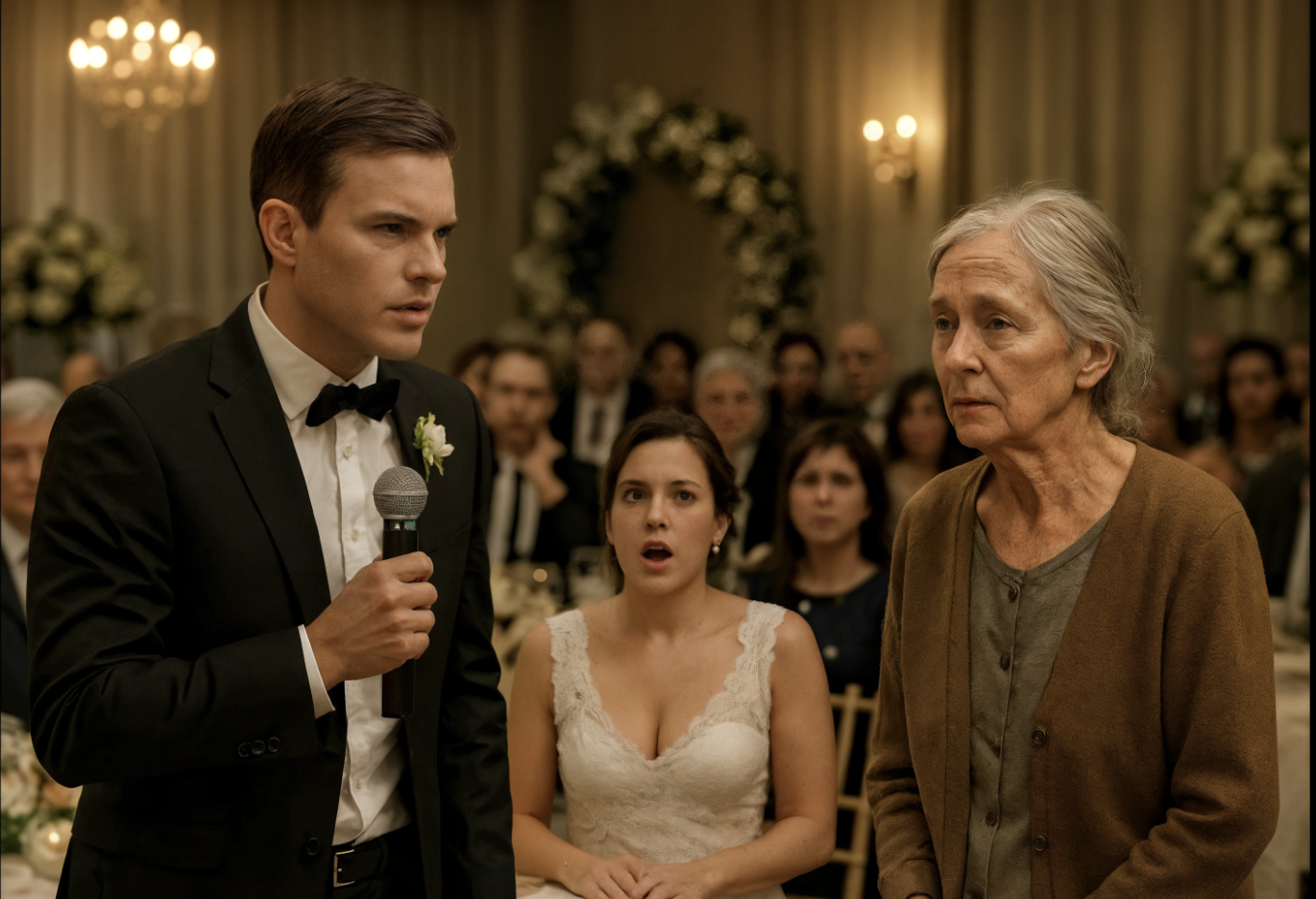The reception hall shimmered under sparkling chandeliers, alive with bursts of laughter and joy—a flawless celebration. Every element had been meticulously organized: the exquisite floral arrangements, a string quartet’s melodies, and the gourmet cuisine enriching the evening. Yet amidst this grandeur, one guest drew attention—a delicate elderly woman wearing worn shoes and a plainly faded dress, visibly past its prime.
This woman was Maria, the mother of the groom.
She entered quietly, holding her head high despite sidelong glances and whispered comments. No one offered her a seat; the staff seemed unsure if she was meant to be there. Nevertheless, Maria remained standing toward the back of the room, her gaze fixed on her son, who looked impeccable in his tuxedo.
When the feast reached its height and speeches began, Daniel, the groom, raised his glass. He spoke confidently about ambition, the strength required to build a life from nothing, and the creation of prosperity.
But as his eyes landed on his mother, his tone shifted dramatically.
“To those who pulled me down for years, who embarrassed me because of their poverty and ignorance, I say: thank you for showing me what I never want to become again. You taught me what shame truly is. I have turned the page. I am no longer the ragged boy I once was. I am now a man who has achieved much. I no longer need reminders of my past. So please,” his voice hardened, “leave. You are not welcome here.”
An astonished silence fell over the crowd. Guests exchanged uneasy looks. The bride’s smile froze.
Maria stood still, her hands trembling—not with anger, but sorrow.
She could have walked away, and she had every reason to do so. Yet, she took a step forward and asked the DJ for the microphone. After a brief pause, he handed it over.
Her voice, soft yet resonant, filled the entire room, commanding attention and quiet.
“Good evening, everyone,” she began. “I apologize for interrupting. I hadn’t planned to speak tonight. I only came to witness a moment I have awaited my whole life: my son’s happiness.”
She looked at Daniel, eyes glistening with pain and pride.
“I remember the day you were born, Daniel. The doctor placed you in my arms, saying, ‘He’s strong.’ I believed it. Your father left when you were three. We had nothing: no shelter, no help. I toiled day and night. I scrubbed floors, cleaned toilets, sometimes went hungry so you could eat. Do you recall when you were ill and I walked five kilometers in the rain to buy medicine? And your school shoes, the ones I stitched each week so you wouldn’t seem different from the other children?”
Her voice shook, but dignity remained.
“I never expected thanks. All I wanted was for your dreams to come true. And look at you now: handsome, successful, married to a lovely woman. You have everything I hoped for.”
She paused, then spoke quietly: “But in chasing success, don’t lose your soul. Remember the hands that held you when you cried, the heart that broke every time yours ached. I have never been ashamed of poverty – in fact, I’m proud to have raised a son capable of flight, even if I remained grounded.”
“Mothers love unconditionally, even when such love is not returned.”
The room remained still, every person immobile.
Maria then surprised everyone by smiling.
“As you asked, I will leave,” she said. “But I do so without bitterness, only love. That is what mothers do: love, even without receiving love back.”
She gently set down the microphone, preparing to depart.
Then, someone stood up.
It was the bride.
“Wait,” she said, her voice wavering. “Please don’t go.”
Tears streaked down her cheeks as she faced Daniel: “How could you speak to your mother like that? This woman gave you everything, and you humiliated her… for what? Appearances? Social standing?”
Daniel looked around: friends, colleagues, even distant relatives were silently judging him. Shame darkened his face like a shadow.
- The bride took Maria’s hand.
- “You raised a good man,” she said, “even if he forgot tonight.”
- “Please, sit beside me. To me, you are the guest of honor.”
After a brief pause, thunderous applause erupted through the hall. The guests rose, honoring the woman who spoke not only with words but through the unwavering love of a mother.
With tears in his eyes, Daniel stepped forward.
“Mom,” he stammered. “I… I’m sorry. I don’t recognize the man I was tonight. I thought success meant forgetting the past. But I realize I was forgetting my heart as well.”
He embraced her—the first time in years.
Maria whispered, “I never stopped loving you, Daniel. Never.”
From that moment, the atmosphere in the reception transformed. Joy no longer resided in decorations or lavish food but blossomed in the reconciliation of mother and son, healing a fractured bond, and reminding everyone that love is life’s greatest treasure.
Maria took her seat beside the bride at the head table, hands now steady. When the time came for the mother-son dance, Daniel approached her, knelt, and asked, “Would you dance with me?”
She smiled through her tears. “Of course, my son.”
As they swayed to a slow, poignant melody, the guests witnessed not an extravagant wedding, but a moving tale of redemption, humility, and boundless love.
Key Insight: True success is hollow if it costs you those who loved you when you had nothing. Always cherish the hands that nourished you, the arms that carried you, and the heart that never gave up on you.
In concluding, this story profoundly reminds us that personal achievements must never overshadow the significance of family bonds. Recognizing and honoring the sacrifices of those who supported us from the very beginning enriches the meaning of any accomplishment. Love, especially that of a mother’s, remains priceless and enduring beyond any social triumph.
